The Alfred Toepfer Stiftung F.V.S. is a German foundation established in 1931 by the Hamburg merchant Alfred Toepfer. The foundation is committed to promoting European unification and ensuring cultural diversity and understanding between the countries of Europe.
The rich industrialist Alfred Toepfer is considered, by the contemporary historiographic criticism, a controversial figure; philanthropist and lover of the arts, he had a significant role in the culture, politics and economic environment of Nazi Germany from the 30s until the end of the Second World War. The activity of Toepfer in between the two World Wars, is well documented by a massive cultural promotion of the ideas of common ethics and identity, obviously symbiotic with Nazi ideology. Toepfer however, after the war, denied any kind of Nazi involvement completely and categorically. [1] [2]
The substantial abdication of his politic and ideologic past, is recognised by critics nowadays in the important range of prizes instituted by the [a] foundation, [3] which are:
The foundation cooperates also with the most important German universities and renowned cultural associations. The Heinrich Tessenow Medal is a prestigious architecture prize, created by the Alfred Toepfer Stiftung F.V.S. in 1963 in memoriam of Rostock architect Heinrich Tessenow. The prize is annually assigned by the Heinrich-Tessenow-Gesellschaft e.V. and among the rewardeds are Giorgio Grassi (1992), Juan Navarro Baldeweg (1998), David Chipperfield (1999), Eduardo Souto de Moura (2001) besides the Pritzker Prize winners Sverre Fehn (1997) and Peter Zumthor (1989).

Johannes Bobrowski was a German lyric poet, narrative writer, adaptor and essayist.

Heinrich Tessenow was a German architect, professor, and urban planner active at the time of the Weimar Republic.
The Hanseatic Goethe Prize was a German literary and artistic award, given biennially from 1949 to 2005 to a figure of European stature. The prize money was €25,000. On the occasion of Goethe's 200th birthday, the Freiherr vom Stein Foundation in Hamburg endowed a cultural prize "for important personalities in the intellectual life". The prize was awarded by the foundation of the Hamburg businessman Alfred Toepfer, Alfred Toepfer Foundation F. V. S..
The Herder Prize, named after the German philosopher Johann Gottfried Herder (1744–1803), was a prestigious international prize awarded every year from 1964 to 2006 to scholars and artists from Central and Southeast Europe whose life and work have contributed to the cultural understanding of European countries and their peaceful interrelations. Established in 1963, the first prizes were awarded in 1964.
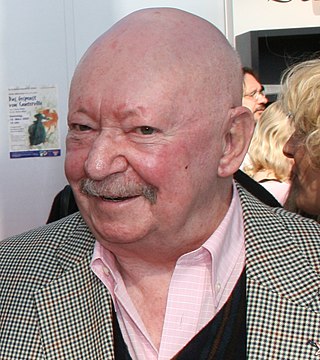
Günter Kunert was a German writer. Based in East Berlin, he published poetry from 1947, supported by Bertold Brecht. After he had signed a petition against the deprivation of the citizenship of Wolf Biermann in 1976, he lost his SED membership, and moved to the West two years later. He is regarded as a versatile German writer who wrote short stories, essays, autobiographical works, film scripts and novels. He received international honorary doctorates and awards.

The charitable foundation Zeit-Stiftung Ebelin und Gerd Bucerius is registered in Hamburg. Its aim is to fund projects in research and scholarship, arts and culture, as well as education and training. It was founded in 1971 by Gerd Bucerius and carries the name of the founder, the title of the weekly newspaper Die Zeit, which he co-founded, and the nickname of his second wife, Gertrud Ebel, Ebelin.

Josef Weinheber was an Austrian lyric poet, narrative writer and essayist.
The Robert Schuman Prize for European unity was a prize awarded annually by the Hamburg Alfred Toepfer Foundation, in memory of former French Prime Minister Robert Schuman. The award, first given in 1966, was discontinued in 2000.
Theodore Antoniou, was a Greek composer and conductor. His works vary from operas and choral works to chamber music, from film and theatre music to solo instrumental works. In addition to his career as composer and conductor, he was professor of composition at Boston University. His education included studies in violin, voice, and composition at the National Conservatory of Athens, the Hellenic Conservatory, and conducting at both The Hochschule für Musik and the International Music Centre in Darmstadt. He was a member of the Academy of Athens.
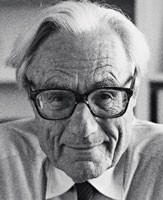
Gerd Bucerius was a German politician, publisher and journalist, one of the founding members of Die Zeit. He is the namesake of the Bucerius Law School in Hamburg and of the Bucerius Kunst Forum, an art gallery.
The Network for Reporting on Eastern Europe (n-ost) is an international non-governmental organization and a registered association based in Berlin. Also known by the acronym n-ost, the Network for Reporting on Eastern Europe is led by Executive Director Hanno Gundert and a seven-member board. The organisation has its main office with full-time staff in Berlin's Kreuzberg district.
The KAIROS Prize has been awarded to European artists and scholars from the fields of visual and performing arts, music, architecture, design, film, photography, literature and journalism since 2007 by the Alfred Toepfer Foundation in Hamburg. It is endowed with a sum of 75,000 Euro.
The Heinrich Tessenow Gold Medal (Heinrich-Tessenow-Medaille) is an architecture award established in 1963 by the Alfred Toepfer Stiftung F.V.S. of Hamburg in honour of Heinrich Tessenow. It is awarded by the Heinrich-Tessenow-Gesellschaft e.V. "to honour people who have achieved distinction in craft and industrial form-making and in the teaching of the culture of living and building, and who have through their life's work acted in the spirit of Heinrich Tessenow". Until 2006, the medal was awarded annually.
Massimo Carmassi is an Italian architect.
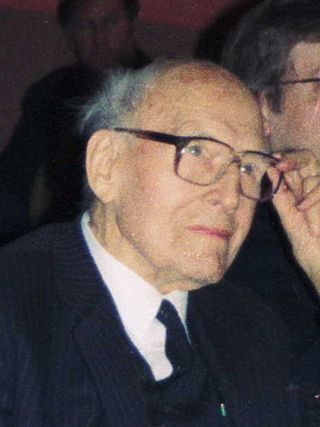
Alfred Carl Toepfer was a German entrepreneur, owner of the company Toepfer International and founder of the Alfred Toepfer Foundation. He helped to shape the original internal markets of the European Coal and Steel Community, and was a philanthropist known for his celebration of the arts, sciences, and nature.
Juan Navarro Baldeweg is a Spanish architect, painter, and sculptor. He directs the architectural studio Navarro Baldeweg Asociados in Madrid.

Jan Philipp Fürchtegott Reemtsma is a German literary scholar, author, and patron who founded and was the long-term director of the Hamburg Institute for Social Research. Reemtsma lives and works mainly in Hamburg.
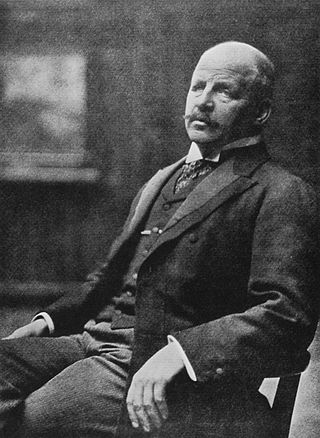
Alfred Lichtwark was a German art historian, museum curator, and art educator in Hamburg. He is one of the founders of museum education and the art education movement.
Hans-Joachim Riecke or Hans-Joachim Ernst Riecke was a German Nazi politician and Gruppenführer in the SS. During World War II Riecke was the State Secretary (Staatssekretär) to Herbert Backe, the Reichsminister of Food and Agriculture. He was Backe's accomplice in planning and implementing the Hunger Plan which resulted in the death by starvation of millions of people in the Soviet Union.
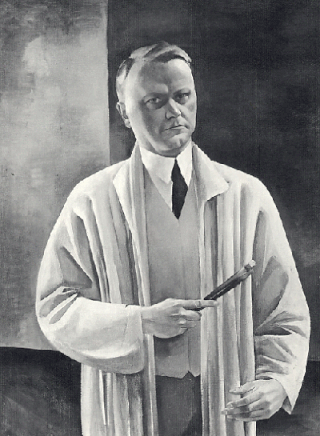
Heinrich Stegemann was a German Expressionist painter and sculptor.